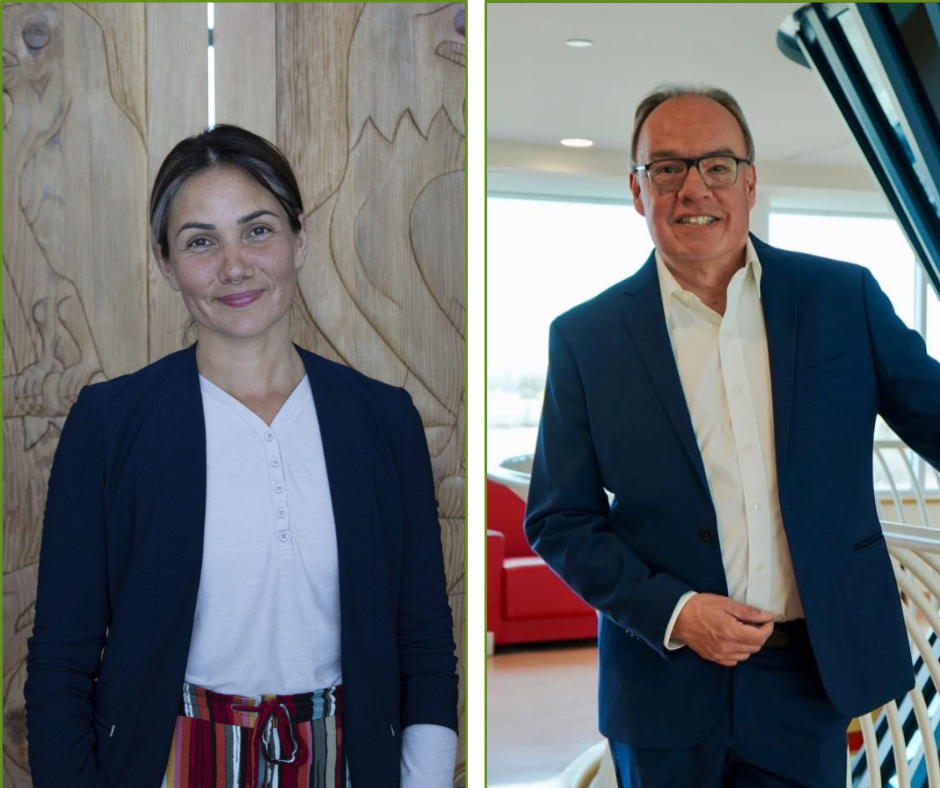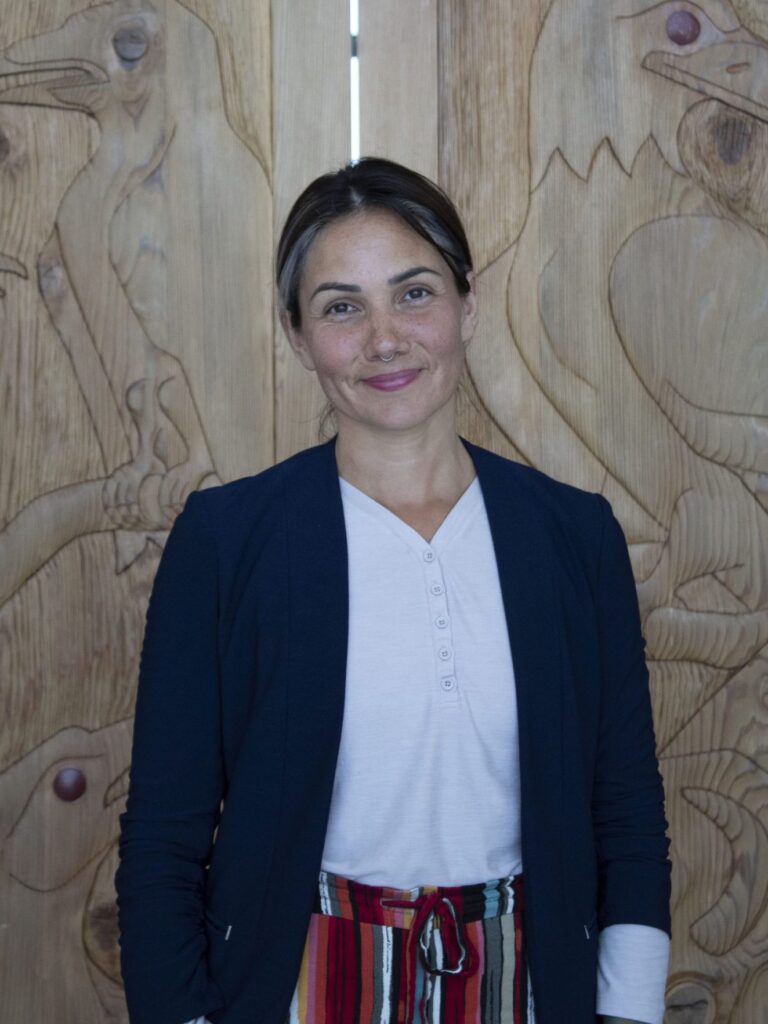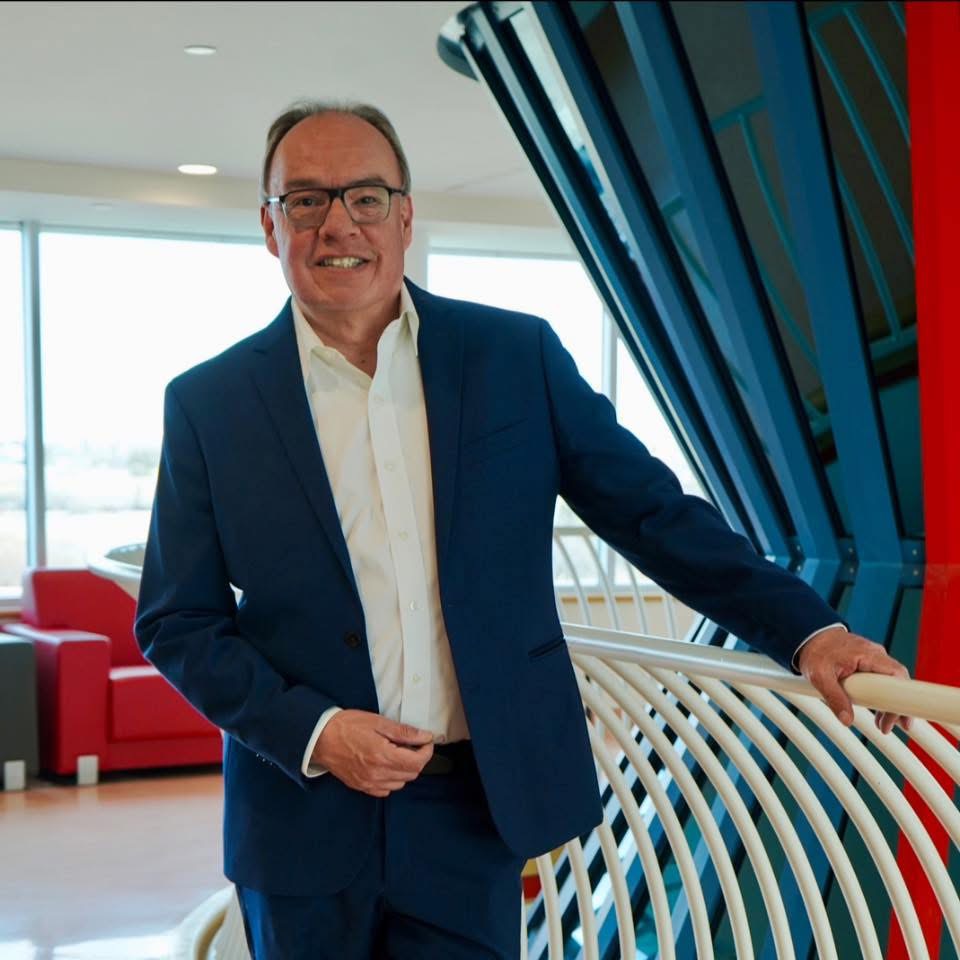
Meet faculty member Tammy Ratt with Indigenous Languages and Nelson Bird with the Indigenous Journalism & Communication Arts Programs. They shared new interesting facts about themselves in a recent interview.

Where are you from?
I am from Regina and Pinehouse Lake, SK. I grew up in Yellowknife NWT and Regina, SK.
What is your area of study?
I study methods to teach Cree language. Specifically, I am interested in using traditional or historical art practises as methods and spaces to learn language.
What do you research? Do you publish or have books (and do you want to talk about your publications?)
Yes, I publish. I love to write. I love everybody to know my thoughts. My goal is to publish a book one day about the research I do.
Ratt, T. (2022). miskasowin askîhk: Coming to Know Oneself on the Land. In Education, 27(2), 37–51. https://doi.org/10.37119/ojs2022.v27i2b.615
Daniels, B., Ratt, T., Custer, A., Sterzuk, A., Griffith Brice, M., Fayant, R. (2024) ē-pīwīcihtāsowin ahpō ē-pī-wīchisowin: Non-Indigenous learners in Indigenous language-learning spaces. Critical Inquiry in Language Studies.
Ratt, T., Daniels, B., Stevenson, R., & Sterzuk, A. (2023). “When I chose to become a teacher, I was agreeing to perpetuating colonialism”: Experiences of colonialism in Saskatchewan educational systems. In Nick Limerick, Jamie Schissel, Mario López Gopar and Vilma Huerta (Eds). Colonialism, Language, and Education Across the Americas. Teachers College Press
Ratt, T. (2024, Nov. 4). nipakosêyihtamawâwak aniki ayisiyiniwak ê-kisêwâtisicik êkwa ê-wiyâtikosocik (I hope that people are kind and happy/joyful) through our Indigenous language reclamation journeys.
What are you most proud of?
I am most proud of my stability. My family. I love my girls. I am proud of how far I have come.
Do you have a 5-year plan? What does it include?
My 5-year plan is to finish my PhD. I see myself somewhere hot. I want to start an Indigenous language art camp somewhere in the forest.

Where are you from?
Peepeekisis Cree Nation is where I was raised. I moved to Regina as a teen and lived here for the majority of my life. I always say that my home is here. I will retire here. I like the community. It is small enough that my wife and I are always running into friends. The University here is like a second home.
What is something we don’t know about you?
I am a Jack of All Trades! Plumbing, landscaping, electrical work… it all stems from doing building maintenance starting when I was 19. Most of my skills are in the realm of journalism, but I have skills beyond that, in the trades. I love physical labour. That type of work keeps us grounded. I fit right in back home on the reserve. I can do my share of the heavy lifting.
What is your area of study?
Indigenous Communications and Arts (INCA). I started about one year ago. I work with communications, multimedia, and I emphasize storytelling, teaching the new generation skills and teaching them how and why these stories should be heard. For example, as a journalist I told stories that included conflict on both sides. In contrast, Indigenous oral history is how we learn language, and is not about fiction. It is about lessons, and is another way of learning. First-hand accounts are so important since they resonate and are passed on. My method, my whole career was an avenue by which stories are shared. Not my stories. All stories from all people.
What do you research? Do you publish or have books (and do you want to talk about your publications?)
I have not spent my career as an academic. My area of expertise is journalism and I have spent more than 25 years with CTV News as a reporter, producer, anchor and most recently as a daily news manager.
I do have two degrees. One in Indigenous Studies from FNUniv, and a 4 year degree in Journalism and Communications from the University of Regina.
I have started a memoir! People kept saying that I should write my stories down. It is part of the legacy that I want to leave. These stories are stories of people in general, but demonstrate specific messages; for example, as a first generation survivor of residential school, I want to teach and show that we can survive. I also want to stress humour. It is part of coping tools, of how we have coped with tragedy as Indigenous people. We could be facing addictions, homelessness, death… we cope with humour. I want to teach two goals to live by: to learn something new everyday and: to make someone laugh everyday.
Speaking of my legacy, I want to talk about my favourite teacher – my Mom. She taught me strength, determination, hard work, and even how to make bread. She was a schoolteacher.
What are you most proud of?
The fact that I’ve been fortunate to meet and share stories of Elders and people who have had long lives. CTV allowed me to bring and digitize my archive. A woman allowed me to share her story that she wanted to tell future generations in 8 minutes, and that was enough time for me to be able to share her message. It is a gift that I was given by the Universe, really, that I will pass forward.
Do you have a 5-year plan? What does it include?
I signed a 5-year contract and plan to retire and spend my time doing what I want to do: go to lectures, see friends and family, read books, garden. I may get a job at Home Hardware. That could be fun.